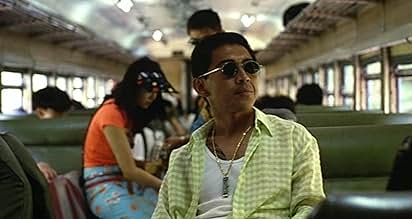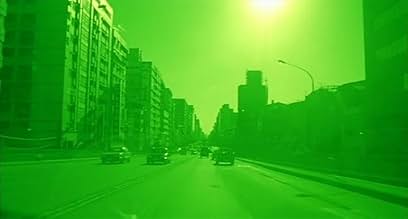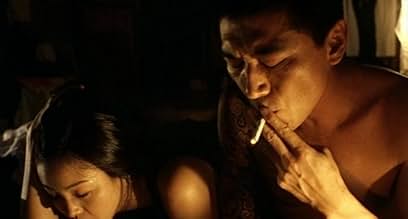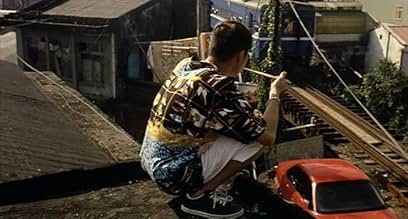NOTE IMDb
7,2/10
2,1 k
MA NOTE
La période de transition politique que vit Taïwan favorise l'émergence de petits malfrats, dont Kao, Tête d'Obus et Patachou. Dès que leurs affaires tournent mal, ils font appel a Hsi, leur ... Tout lireLa période de transition politique que vit Taïwan favorise l'émergence de petits malfrats, dont Kao, Tête d'Obus et Patachou. Dès que leurs affaires tournent mal, ils font appel a Hsi, leur ainé et protecteur, pour les sortir du pétrin.La période de transition politique que vit Taïwan favorise l'émergence de petits malfrats, dont Kao, Tête d'Obus et Patachou. Dès que leurs affaires tournent mal, ils font appel a Hsi, leur ainé et protecteur, pour les sortir du pétrin.
- Réalisation
- Scénario
- Casting principal
- Récompenses
- 2 victoires et 2 nominations au total
Avis à la une
Goodbye South Goodbye provides a raw, harsh look on the aimless and moral-less underclass of Taiwan. The way the director Hsiao-hsien Hou made the film out to be, including his style of off-screen dialog, long continuous shots and scenes of motion creates a view that mirrors what the characters perceive and feels, whether it is helplessness, freedom and joy, calm before the storm or calm before no storm. The lost underclass that seems to be disconnected from the old and modern world, having nothing much more too look forward to except the reward of riches through whatever schemes available. But the reality is that they will only move from scheme to scheme, never achieving what they truly desires. And throughout the whole time, they will just carry on and waste away in the world that has trapped them there.
While Hou is concerned with socio-political themes, Goodbye South, Goodbye's story is far less interesting than the method of its presentation. Not until the second screening did I care much about the events of the plot, but the intricate direction is amazing.
The acting appears very realistic, not, I think, because of great actors, but because Hou controls their environment so carefully. I feel they directly express less than the subtler expressiveness of Hou's style: long takes, colour filters, off-screen sound effects, vehicle-based dolly shots, compositions through doorways and over foreground obstacles, music.
But Hou doesn't even seem preoccupied by his motifs. Driving this film is a precise rhythm. Hou is perfectly willing to shuffle his scenes out of narrative order so long as it produces the desired change in tone and tempo. Also, some moments of dramatic importance are prequeled in the previous four or five (less relevant) scenes. And just before these consequential moments he pulls off the most interesting gimmick of all: long (3-4 minutes) shots of miniscule (?) narrative value; it's all so superficially dull!
Which seems to be the exact point. Successfully, Hou lulls us into a relaxed state-of-mind before hitting us on the head with a pivotal scene. Very manipulative but how clever! When you're in the safe hands of a proficient director, the devices they use to assault the senses become digestible. So, even though my sense of narrative timing and progression was confronted in Goodbye South, Goodbye, it didn't lower my level of appreciation. As for the story? Well....
But Lim Giong is terrific and so is his music!
The acting appears very realistic, not, I think, because of great actors, but because Hou controls their environment so carefully. I feel they directly express less than the subtler expressiveness of Hou's style: long takes, colour filters, off-screen sound effects, vehicle-based dolly shots, compositions through doorways and over foreground obstacles, music.
But Hou doesn't even seem preoccupied by his motifs. Driving this film is a precise rhythm. Hou is perfectly willing to shuffle his scenes out of narrative order so long as it produces the desired change in tone and tempo. Also, some moments of dramatic importance are prequeled in the previous four or five (less relevant) scenes. And just before these consequential moments he pulls off the most interesting gimmick of all: long (3-4 minutes) shots of miniscule (?) narrative value; it's all so superficially dull!
Which seems to be the exact point. Successfully, Hou lulls us into a relaxed state-of-mind before hitting us on the head with a pivotal scene. Very manipulative but how clever! When you're in the safe hands of a proficient director, the devices they use to assault the senses become digestible. So, even though my sense of narrative timing and progression was confronted in Goodbye South, Goodbye, it didn't lower my level of appreciation. As for the story? Well....
But Lim Giong is terrific and so is his music!
Those about to watch this modern masterpiece, be advised: you're going down a road of unexpected darkness and terror, cloaked in what appears to be the banal trappings of ordinary existence. But through the lens of Hou's camera, this is anything but ordinary.
To see this, one has to rid oneself of conventional thinking of what it means for a movie to "take" you somewhere. So when a critic whines, "I'm dying for a change of scenery!", it's obvious that they've too accustomed to standard-issue Hollywood storytelling to appreciate something entirely different and new: the mysterious, inexplicable rhythms of REAL LIFE. A life that alternates between static, stagnant waiting for things to happen, and sudden moments of motion and . The first shot explains so much of this: people who are moving and standing still at the same time -- who pass through light and darkness with the same impassive, zonked out expression, waiting for SOMETHING to happen while letting their favorite punk tune release their pent up energy, ambitions and frustrations.
So much of this film is like listening to a good song -- just allowing yourself to be bathed in sensation, to delight in little things that you notice but add so much to the overall experience. You simply can't demand standard point A to point B plot points on a movie that is interested in something entirely different. Because LIFE DOES NOT HAVE PLOT POINTS. What it does have are a multitude of wonders, in gestures, colors, and moments of surprising joy and terror. And what does it all lead to? Who knows. That's why it's life. So when someone says "Why watch a film if there's not a single worthwhile aspect to offer?" he's obviously dissassociated the experience of movies from the experience of real life.
As I've re-watched and reflected on this film, I find it to be one of the essential statements on what it's like to live in the fast lane of modern-day, globalized civilization. This film may resemble American small-time gangster flicks (most notably MEAN STREETS and GOODFELLAS) but compared to this movie those movies, as great as they are, seem simple-minded in their narrative structure and explicated themes. This film gives you the feeling of what it FEELS like to be in the shoes of these sorry saps, with all their petty ambitions and fears that end up meaning quite a lot by the time we get to that terrifying last shot, where a big nothing moment amounts to everything.
To see this, one has to rid oneself of conventional thinking of what it means for a movie to "take" you somewhere. So when a critic whines, "I'm dying for a change of scenery!", it's obvious that they've too accustomed to standard-issue Hollywood storytelling to appreciate something entirely different and new: the mysterious, inexplicable rhythms of REAL LIFE. A life that alternates between static, stagnant waiting for things to happen, and sudden moments of motion and . The first shot explains so much of this: people who are moving and standing still at the same time -- who pass through light and darkness with the same impassive, zonked out expression, waiting for SOMETHING to happen while letting their favorite punk tune release their pent up energy, ambitions and frustrations.
So much of this film is like listening to a good song -- just allowing yourself to be bathed in sensation, to delight in little things that you notice but add so much to the overall experience. You simply can't demand standard point A to point B plot points on a movie that is interested in something entirely different. Because LIFE DOES NOT HAVE PLOT POINTS. What it does have are a multitude of wonders, in gestures, colors, and moments of surprising joy and terror. And what does it all lead to? Who knows. That's why it's life. So when someone says "Why watch a film if there's not a single worthwhile aspect to offer?" he's obviously dissassociated the experience of movies from the experience of real life.
As I've re-watched and reflected on this film, I find it to be one of the essential statements on what it's like to live in the fast lane of modern-day, globalized civilization. This film may resemble American small-time gangster flicks (most notably MEAN STREETS and GOODFELLAS) but compared to this movie those movies, as great as they are, seem simple-minded in their narrative structure and explicated themes. This film gives you the feeling of what it FEELS like to be in the shoes of these sorry saps, with all their petty ambitions and fears that end up meaning quite a lot by the time we get to that terrifying last shot, where a big nothing moment amounts to everything.
Goodbye South Goodbye presents a beautifully delineated portrait of a generation of Taiwanese cut off from their society's traditional values. Hou records a world stuck in short-lived businesses and scams in which the characters have no real shot at economic advancement. The characters are cold, rootless, and basically corrupt. No real communication is taking place here. It reminds me of "The Wind Will Carry Us" where the cell phone represents an intrusion of western technology in a village steeped in tradition.
This film portrays the contrast between the almost feudal tradition and its hierarchy with gangsterism and corrupt business practices. Somehow, Hou transcends this feeling of entrapment and aimlessness with long takes of lyrical beauty. For example, the green filter shown when the three are riding through a tunnel in Taipei, the three riding their motorcycles up a steep hill, a moment of grace and freedom.
The camera in this film does not judge. It simply records the unfolding of events. Hou simply discloses the character of complex relationships and situations. This film, like all of HHHs films that I've seen including his new "Millennium Mambo", is pulsating with rhythm, the rhythm of a train, the rhythm of punk music, the rhythm of life.
This film portrays the contrast between the almost feudal tradition and its hierarchy with gangsterism and corrupt business practices. Somehow, Hou transcends this feeling of entrapment and aimlessness with long takes of lyrical beauty. For example, the green filter shown when the three are riding through a tunnel in Taipei, the three riding their motorcycles up a steep hill, a moment of grace and freedom.
The camera in this film does not judge. It simply records the unfolding of events. Hou simply discloses the character of complex relationships and situations. This film, like all of HHHs films that I've seen including his new "Millennium Mambo", is pulsating with rhythm, the rhythm of a train, the rhythm of punk music, the rhythm of life.
That line is spoken about halfway through Hou Hsiao-hsien's 1996 film Goodbye South, Goodbye by a woman who is thinking of moving to America to help out her sister. Well, the context doesn't really matter. It's just that, when I heard her say that line, I was thinking, "I'm with you, sister!" For two months now, on every Friday night save two, I have attended a Hou Hsiao-hsien film. Not one of them has varied from the next more than the slightest iota in style or content. Two were interesting, but flawed: Dust in the Wind and City of Sadness. One was mediocre: Good Men, Good Women. Three were total bores: A Time to Live, a Time to Die, The Puppetmaster, and now Goodbye South, Goodbye.
The program notes for Goodbye South, Goodbye say this: "Hou leaves behind his static camera, opting for one that moves restlessly as his characters." I want to know what the hell film the person who wrote that was watching. In GSG, Hou follows the same style to a T in around 80% of the film's scenes. Read my review (pan) of The Puppetmaster on IMDb, in which I identify and deconstruct Hou's uninventive cinematic techniques. Every one I point out in that review is used half a dozen times in this film. But wait! The camera does, in the remaining 20% of the scenes, move restlessly: Hou adopts two new techniques here: 1) shots taken from the back of a moving vehicle which either observes another moving vehicle or does not; 2) hand-held sequences. The only thing is that Hou inserts these two variations to his duller-than-paint-drying style so self-consciously that they end up clashing with the more run-of-the-mill scenes greatly. These few scenes are all, with maybe one small exception, merely connecting scenes. Any scene which is important to the "plot" or "character development" (in scare quotes because Hou doesn't believe in telling a story or building strong characters; or, for completion's sake, in artful shot composition, either) is filmed in the type of static shot that anyone familiar with Hou's films should recognize immediately. Also, in an attempt to bolster (or, more likely, to pretend to bolster) the film's excitement level, Hou inserts loud industrial music. A good song, to be sure, I believe performed by the guy who plays Flatty, but it totally does not belong. What Hou fanatics (I refuse to shorten that word to "fans") see as a new shift in his style is nothing more than a pseudo-shift, one calculated to cause the fanatics to believe that he has changed and is thus evolving. No evolution here whatsoever.
In every medium of art I have examined, I have never come upon an artist so thoroughly and purposefully unengaging as Hou Hsiao-hsien. His goal is clearly to subvert cinematic conventions and expectations, I'm sure, but he's completely forsaken anything at all interesting. Why watch a film if there's not a single worthwhile aspect to offer? My guess is that Hou doesn't even KNOW how to make a film, at least not how to do it well. As he began to make films in the 1980s, Taiwanese and Chinese critics probably identified his style and proclaimed him an auteur. This, I assume, went to his head. As an auteur, he was then compelled to retain his style as tightly as possible. All he knows about auteurs is that they repeat certain aspects of their films, and that auteurists find that interesting. Let's take one common Hou scene: he often depicts characters eating. A different auteur would use an eating scene to bring out aspects of his characters. Take Hitchcock, for instance. Whenever characters in his films eat, it is important. Take Strangers on a Train: Bruno, the villain, orders lamb chops, French fries, and chocolate ice cream for lunch. Quite the lunch! This shows the kind of hedonistic lifestyle he lives. Now take Norman Bates in Psycho, how he is always nervously eating candy, or what he says about how the term "eating like a bird" is a falsity, that they really eat "an enormous lot." But when a Hou Hsiao-hsien character eats, he is just eating. Nothing more to it than that. So Hou doesn't retain substance between his films, he only retains content. He uses eating scenes because, well, he used them in his previous films.
Next week, Flowers of Shanghai is playing. It is purported to be Hou's best film. I will see it: hell, if I was the type to be discouraged, I would have only seen one of his films (and, to be truthful, I am perfectly glad that I saw Dust in the Wind and I am actually eager to see City of Sadness again). I hope, I dearly hope, as I have hoped every time I've sat down in the theater, that the Hou film about to be shown will impress the heck out of me. Somehow, I doubt it. Whatever the praise of the next film, I'm just dying for a change in scenery. 5/10.
The program notes for Goodbye South, Goodbye say this: "Hou leaves behind his static camera, opting for one that moves restlessly as his characters." I want to know what the hell film the person who wrote that was watching. In GSG, Hou follows the same style to a T in around 80% of the film's scenes. Read my review (pan) of The Puppetmaster on IMDb, in which I identify and deconstruct Hou's uninventive cinematic techniques. Every one I point out in that review is used half a dozen times in this film. But wait! The camera does, in the remaining 20% of the scenes, move restlessly: Hou adopts two new techniques here: 1) shots taken from the back of a moving vehicle which either observes another moving vehicle or does not; 2) hand-held sequences. The only thing is that Hou inserts these two variations to his duller-than-paint-drying style so self-consciously that they end up clashing with the more run-of-the-mill scenes greatly. These few scenes are all, with maybe one small exception, merely connecting scenes. Any scene which is important to the "plot" or "character development" (in scare quotes because Hou doesn't believe in telling a story or building strong characters; or, for completion's sake, in artful shot composition, either) is filmed in the type of static shot that anyone familiar with Hou's films should recognize immediately. Also, in an attempt to bolster (or, more likely, to pretend to bolster) the film's excitement level, Hou inserts loud industrial music. A good song, to be sure, I believe performed by the guy who plays Flatty, but it totally does not belong. What Hou fanatics (I refuse to shorten that word to "fans") see as a new shift in his style is nothing more than a pseudo-shift, one calculated to cause the fanatics to believe that he has changed and is thus evolving. No evolution here whatsoever.
In every medium of art I have examined, I have never come upon an artist so thoroughly and purposefully unengaging as Hou Hsiao-hsien. His goal is clearly to subvert cinematic conventions and expectations, I'm sure, but he's completely forsaken anything at all interesting. Why watch a film if there's not a single worthwhile aspect to offer? My guess is that Hou doesn't even KNOW how to make a film, at least not how to do it well. As he began to make films in the 1980s, Taiwanese and Chinese critics probably identified his style and proclaimed him an auteur. This, I assume, went to his head. As an auteur, he was then compelled to retain his style as tightly as possible. All he knows about auteurs is that they repeat certain aspects of their films, and that auteurists find that interesting. Let's take one common Hou scene: he often depicts characters eating. A different auteur would use an eating scene to bring out aspects of his characters. Take Hitchcock, for instance. Whenever characters in his films eat, it is important. Take Strangers on a Train: Bruno, the villain, orders lamb chops, French fries, and chocolate ice cream for lunch. Quite the lunch! This shows the kind of hedonistic lifestyle he lives. Now take Norman Bates in Psycho, how he is always nervously eating candy, or what he says about how the term "eating like a bird" is a falsity, that they really eat "an enormous lot." But when a Hou Hsiao-hsien character eats, he is just eating. Nothing more to it than that. So Hou doesn't retain substance between his films, he only retains content. He uses eating scenes because, well, he used them in his previous films.
Next week, Flowers of Shanghai is playing. It is purported to be Hou's best film. I will see it: hell, if I was the type to be discouraged, I would have only seen one of his films (and, to be truthful, I am perfectly glad that I saw Dust in the Wind and I am actually eager to see City of Sadness again). I hope, I dearly hope, as I have hoped every time I've sat down in the theater, that the Hou film about to be shown will impress the heck out of me. Somehow, I doubt it. Whatever the praise of the next film, I'm just dying for a change in scenery. 5/10.
Le saviez-vous
- AnecdotesConsidered by Cahiers du Cinéma to be one of the three best films of the 1990's, alongside The Bridges of Madison County and Carlito's Way.
- ConnexionsFeatured in Guang yin de gu shi: Tai wan xin dian ying (2014)
Meilleurs choix
Connectez-vous pour évaluer et suivre la liste de favoris afin de recevoir des recommandations personnalisées
- How long is Goodbye South, Goodbye?Alimenté par Alexa
Détails
Contribuer à cette page
Suggérer une modification ou ajouter du contenu manquant
























